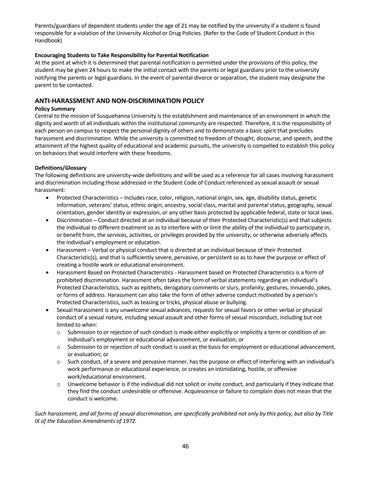Parents/guardians of dependent students under the age of 21 may be notified by the university if a student is found responsible for a violation of the University Alcohol or Drug Policies. (Refer to the Code of Student Conduct in this Handbook) Encouraging Students to Take Responsibility for Parental Notification At the point at which it is determined that parental notification is permitted under the provisions of this policy, the student may be given 24 hours to make the initial contact with the parents or legal guardians prior to the university notifying the parents or legal guardians. In the event of parental divorce or separation, the student may designate the parent to be contacted.
ANTI-HARASSMENT AND NON-DISCRIMINATION POLICY
Policy Summary Central to the mission of Susquehanna University is the establishment and maintenance of an environment in which the dignity and worth of all individuals within the institutional community are respected. Therefore, it is the responsibility of each person on campus to respect the personal dignity of others and to demonstrate a basic spirit that precludes harassment and discrimination. While the university is committed to freedom of thought, discourse, and speech, and the attainment of the highest quality of educational and academic pursuits, the university is compelled to establish this policy on behaviors that would interfere with these freedoms. Definitions/Glossary The following definitions are university-wide definitions and will be used as a reference for all cases involving harassment and discrimination including those addressed in the Student Code of Conduct referenced as sexual assault or sexual harassment: • Protected Characteristics – Includes race, color, religion, national origin, sex, age, disability status, genetic information, veterans’ status, ethnic origin, ancestry, social class, marital and parental status, geography, sexual orientation, gender identity or expression, or any other basis protected by applicable federal, state or local laws. • Discrimination – Conduct directed at an individual because of their Protected Characteristic(s) and that subjects the individual to different treatment so as to interfere with or limit the ability of the individual to participate in, or benefit from, the services, activities, or privileges provided by the university, or otherwise adversely affects the individual's employment or education. • Harassment – Verbal or physical conduct that is directed at an individual because of their Protected Characteristic(s), and that is sufficiently severe, pervasive, or persistent so as to have the purpose or effect of creating a hostile work or educational environment. • Harassment Based on Protected Characteristics - Harassment based on Protected Characteristics is a form of prohibited discrimination. Harassment often takes the form of verbal statements regarding an individual’s Protected Characteristics, such as epithets, derogatory comments or slurs, profanity, gestures, innuendo, jokes, or forms of address. Harassment can also take the form of other adverse conduct motivated by a person’s Protected Characteristics, such as teasing or tricks, physical abuse or bullying. • Sexual Harassment is any unwelcome sexual advances, requests for sexual favors or other verbal or physical conduct of a sexual nature, including sexual assault and other forms of sexual misconduct, including but not limited to when: o Submission to or rejection of such conduct is made either explicitly or implicitly a term or condition of an individual's employment or educational advancement, or evaluation; or o Submission to or rejection of such conduct is used as the basis for employment or educational advancement, or evaluation; or o Such conduct, of a severe and pervasive manner, has the purpose or effect of interfering with an individual's work performance or educational experience, or creates an intimidating, hostile, or offensive work/educational environment. o Unwelcome behavior is if the individual did not solicit or invite conduct, and particularly if they indicate that they find the conduct undesirable or offensive. Acquiescence or failure to complain does not mean that the conduct is welcome. Such harassment, and all forms of sexual discrimination, are specifically prohibited not only by this policy, but also by Title IX of the Education Amendments of 1972.
46

